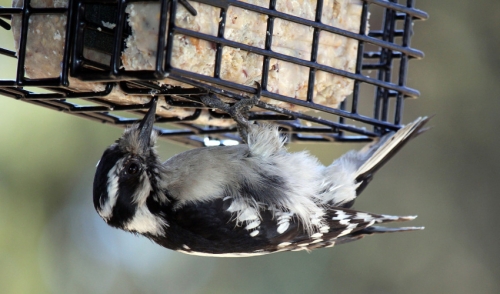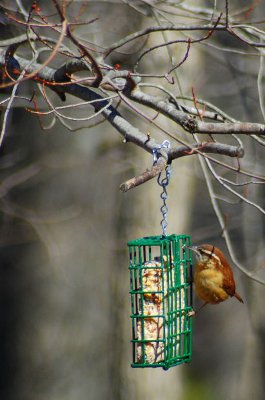{article.name}
Agway, NY -
Hometown Values & Service!
Chatham Agway: 518-392-3241
Claverack Agway: 518-851-5391
Great Barrington Agway: 413-528-2390
Millerton Agway: 518-789-4471
Best Practices When Feeding a Bird Suet

- Share this:
- Share on Facebook
- Pin on Pinterest
- Tweet on Twitter
Suet is a rich energy source ideal for many birds, especially during migration when birds need more fuel to complete their journeys or in winter when they convert the calories to essential body heat.
 Suet cannot just be tossed into a platform feeder or left out for weeks at a time, however, and there are steps every backyard birder should take to offer this healthy treat in a safe, easy way.
Suet cannot just be tossed into a platform feeder or left out for weeks at a time, however, and there are steps every backyard birder should take to offer this healthy treat in a safe, easy way.
-
Use a Proper Feeder
Suet feeders come in different styles such as logs, cages or nets, but they all allow birds to easily cling where they can access the suet. Woodpeckers, nuthatches and other clinging birds prefer suet, and it is essential to provide a way these birds can comfortably get to the treat.
-
Offer a Tasty Blend
While plain suet can be offered to backyard birds, choosing a blend with bits of nuts, fruit or insects mixed in will attract more birds and offer even more nutrition. If squirrels are just as attracted to the suet, try a hot pepper blend to discourage them (birds don't mind hot tastes!).
-
Keep the Feeder Accessible
Many birds that enjoy suet can be solitary or shy at backyard feeding stations, and the suet feeder should be positioned near trees where the birds are likely to be perching. Feeders can even be attached directly to tree trunks for easy and convenient access.
-
Keep It Cool
Suet can quickly spoil or melt on warm days, creating an unsightly, stinky mess. Position the suet feeder in a deeply shaded spot to keep it cool, and avoid offering suet during the hot summer months. If necessary, freeze the suet before filling the feeder, and birds will feed on it gradually as it thaws.
-
Protect Feeders From Other Wildlife
Birds are not the only backyard visitors that will enjoy suet – raccoons, rats, bears, chipmunks and other wildlife may also try the treat. To avoid their attention, use a wide baffle to protect the feeder and consider bringing suet feeders into a secure garage or shed at night when birds are not feeding but other wildlife is looking for a meal.
-
Offer Treats in Moderation
While suet is a healthy option for backyard birds, it is best to only put out enough suet to be consumed in just a few days. Limiting the amount offered at once will help keep it from going bad or attracting unwanted visitors.
Suet is a great addition to any backyard bird buffet, and if it's offered properly, it will become a healthy and nutritious part of many birds' diets.
© 2026 Millerton Co-op Inc.. All rights reserved.
Serving Millerton, NY - Claverack, NY - Chatham, NY - Great Barrington, MA and the Surrounding Communities.
View our accessibility statement
Driven by New Media Retailer
Agway® is a division of Southern States®



Comments